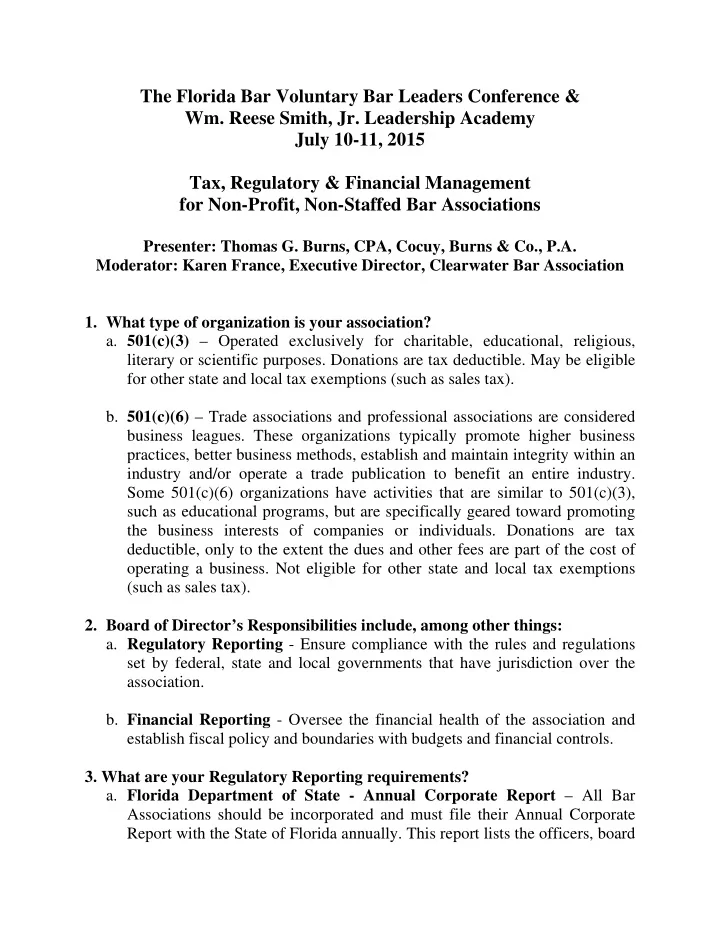

The Florida Bar Voluntary Bar Leaders Conference & Wm. Reese Smith, Jr. Leadership Academy July 10-11, 2015 Tax, Regulatory & Financial Management for Non-Profit, Non-Staffed Bar Associations Presenter: Thomas G. Burns, CPA, Cocuy, Burns & Co., P.A. Moderator: Karen France, Executive Director, Clearwater Bar Association 1. What type of organization is your association? a. 501(c)(3) – Operated exclusively for charitable, educational, religious, literary or scientific purposes. Donations are tax deductible. May be eligible for other state and local tax exemptions (such as sales tax). b. 501(c)(6) – Trade associations and professional associations are considered business leagues. These organizations typically promote higher business practices, better business methods, establish and maintain integrity within an industry and/or operate a trade publication to benefit an entire industry. Some 501(c)(6) organizations have activities that are similar to 501(c)(3), such as educational programs, but are specifically geared toward promoting the business interests of companies or individuals. Donations are tax deductible, only to the extent the dues and other fees are part of the cost of operating a business. Not eligible for other state and local tax exemptions (such as sales tax). 2. Board of Director’s Responsibilities include, among other things: a. Regulatory Reporting - Ensure compliance with the rules and regulations set by federal, state and local governments that have jurisdiction over the association. b. Financial Reporting - Oversee the financial health of the association and establish fiscal policy and boundaries with budgets and financial controls. 3. What are your Regulatory Reporting requirements? a. Florida Department of State - Annual Corporate Report – All Bar Associations should be incorporated and must file their Annual Corporate Report with the State of Florida annually. This report lists the officers, board
of directors and the register agent. The report must be filed by May 1 of each year and the fee is $61.25. A penalty for late filing is an additional $400. The most common question is who should be the registered agent when there is no staff. It is usually a corporate officer, such as the corporate secretary, but you can select any officer of the corporation or you can identify any other individual to act as your registered agent, as long as they have a Florida address. There are companies that will act as your registered agent, but they cost money, for not doing much work. b. Florida Department of Agriculture and Consumer Services – only for charitable contributions. Form DACS-10100 is filed annually. Required if you are soliciting charitable contributions. c. Internal Revenue Service – Form 990 Series of Tax Returns – There are different reporting options, based on your gross receipts each year. Here are the options: i. Form 990-N (e-Postcard) - If gross receipts are $50,000 or less, the association can file an “e-postcard”. This form gives contact information for the association and information on one officer. No financial information is required. No tax due. Form 990-EZ – If gross receipts are $200,000 or less and total ii. assets are $500,000 or less, the association can file a Form 990-EZ. This form gives full financial information and information regarding the association’s mission. No tax due. iii. Form 990 – If gross receipts are in excess of $200,000 or total assets are in excess of $500,000, the association must file a Form 990. This form is quite lengthy and requires more detailed information regarding the operations of the association. No tax due. Note that any association can choose to file a Form 990, regardless of gross receipts or asset levels. iv. Form 990-T and Florida Form F-1120 – These tax returns are required only if the association has unrelated business income of $1,000 or more. Unrelated Business Income is income from a trade or business, regularly carried on, that is not substantially related to the purpose that is the basis for the association’s exempt purpose. The most common type of unrelated business income relates to the
sale of advertising in a newsletter or on a website, even if the advertisers are members of the association. 4 What are your suggested Financial Reporting requirements? a. Items to consider in dealing with bookkeeping issues: i. Who is in charge of the association’s funds? ii. Who physically writes the checks and makes the deposits? iii. Do you require 2 signatures on checks? iv. Who receives the bank statements and reconciles the bank account? v. Do you have adequate segregation of duties? vi. Do you prepare a budget? vii. How is the budget monitored? viii. How do you report your association’s financial operations to the Board? ix. Do you have Directors Liability Insurance? b. Do you have policies recommended by the IRS? i. Conflict of interest – a policy used to identify, disclose and deal with situations where there is a financial or other conflict. This is the one policy that all associations should have, regardless of their size. ii. Expense reimbursement – a policy used to document what is reimbursed to association’s officers and board members and key employees. iii. Whistleblower protection – a policy to encourage employees to report financial and other improprieties by establishing procedures to keep whistleblowers’ identities confidential and to protect them from retaliation. Not applicable if you do not have any employees. iv. Document retention and destruction – a policy to provide guidance on how long records must be kept before they are destroyed.
Recommend
More recommend